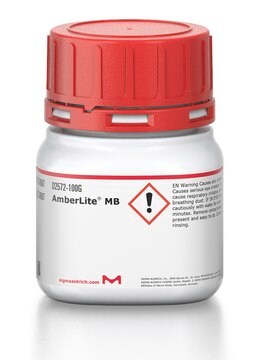62107
Lewatit® MonoPlus TP 214 Ion Exchange Resin
macroporous, 30-35 mesh
Se connecterpour consulter vos tarifs contractuels et ceux de votre entreprise/organisme
About This Item
Produits recommandés
product name
Lewatit® MonoPlus TP 214, ion exchange resin, macroporous
Niveau de qualité
Forme
macroporous
Humidité
43-48%
Technique(s)
LPLC: suitable
Perte
40-60% loss on drying, 110 °C
Matrice
styrene-divinylbenzene (macroporous)
Groupe de la matrice active
thiourea functional group
Taille des particules
400-1250 μm
Capacité
1.0 meq/mL by wetted bed volume
Technique de séparation
affinity
Description générale
Lewatit MonoPlus TP 214 is a type of chelating ion-exchange resin.
Application
Lewatit MonoPlus TP 214 may be used as a mercury-specific adsorber resin for the removal of mercury from contaminated groundwater samples prior to its determination by cold vapor atomic absorption spectrometry (CV-AAS). It may also be used as an ion-exchange resin for the determination of platinum and palladium in particles emitted from automobile exhaust catalysts prior to their analysis using cathodic adsorptive stripping voltammetry (CASV).
Résine chélatante spécialement conçue pour l′élimination des métaux dans les procédés d′hydrométallurgie et pour l′extraction/recyclage du mercure et de l′argent.
Informations légales
Lewatit is a registered trademark of Lanxess Deutschland GmbH
Code de la classe de stockage
11 - Combustible Solids
Classe de danger pour l'eau (WGK)
WGK 3
Point d'éclair (°F)
Not applicable
Point d'éclair (°C)
Not applicable
Équipement de protection individuelle
Eyeshields, Gloves, type N95 (US)
Faites votre choix parmi les versions les plus récentes :
Déjà en possession de ce produit ?
Retrouvez la documentation relative aux produits que vous avez récemment achetés dans la Bibliothèque de documents.
Mercury removal from contaminated groundwater: Performance and limitations of amalgamation through brass shavings.
Richard JH and Biester H
Water Research, 99(1-2), 272-280 (2016)
Marvin Brun-Cosme-Bruny et al.
STAR protocols, 3(4), 101683-101683 (2022-09-19)
Epithelial folding is a fundamental process where initially flat monolayers transform into functional 3D structures. This protocol details fabrication steps for a polycarbonate microfluidic platform which enables triggering epithelial folds that recapitulate stereotypical cell shape changes and folding-associated mechanical stresses.
Claudia G Vasquez et al.
Nature communications, 12(1), 5608-5608 (2021-09-25)
The formation of a hollow lumen in a formerly solid mass of cells is a key developmental process whose dysregulation leads to diseases of the kidney and other organs. Hydrostatic pressure has been proposed to drive lumen expansion, a view
Tim N Koepp et al.
International journal of molecular sciences, 22(17) (2021-09-11)
The renal secretory clearance for organic cations (neurotransmitters, metabolism products and drugs) is mediated by transporters specifically expressed in the basolateral and apical plasma membrane domains of proximal tubule cells. Here, human organic cation transporter 2 (hOCT2) is the main
Sandra Nickel et al.
NPJ Regenerative medicine, 6(1), 84-84 (2021-12-05)
Post-surgery liver failure is a serious complication for patients after extended partial hepatectomies (ePHx). Previously, we demonstrated in the pig model that transplantation of mesenchymal stromal cells (MSC) improved circulatory maintenance and supported multi-organ functions after 70% liver resection. Mechanisms
Notre équipe de scientifiques dispose d'une expérience dans tous les secteurs de la recherche, notamment en sciences de la vie, science des matériaux, synthèse chimique, chromatographie, analyse et dans de nombreux autres domaines..
Contacter notre Service technique



